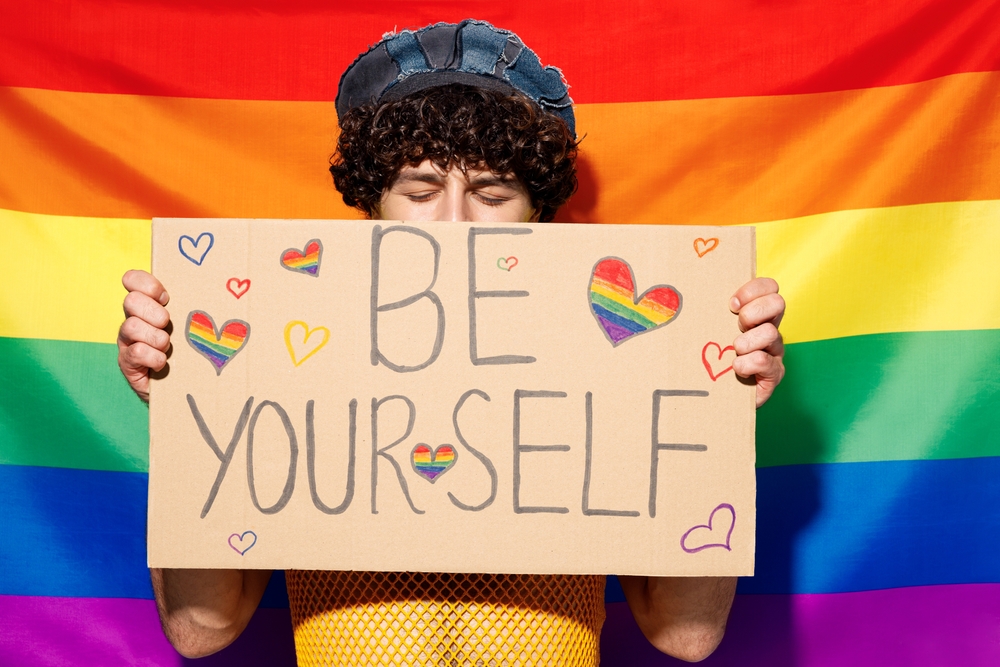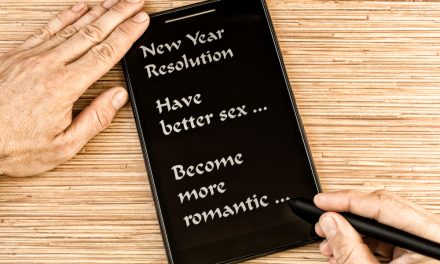(Photo Credits: ViDI Studio from Shutterstock)
In the LGBTQ+ community, labels such as “gay,” “bi,” “top,” “bottom,” “masc,” “fem,” “DL,” and many others play a significant role in identity and expression. However, there’s growing debate about whether label culture is beneficial or harmful. Is gay label culture toxic? Is there a problem with labels in sexuality and society? Adam4Adam readers, we want to hear your thoughts.
Other people argue that labels can serve as a powerful tool for self-identification and community building. They help people understand themselves and find others with similar experiences. For many, embracing a label like “binary” or “queer” can be a liberating and affirming experience. It provides a sense of belonging and validation in a society that often marginalizes non-heteronormative identities.
However, labels can also be restrictive and divisive. Here are some concerns about label culture:
1. Stereotyping and expectations: Labels can lead to stereotyping, where individuals are expected to conform to specific behaviors or appearances associated with their label. This can stifle personal expression and create pressure to fit into predefined molds.
2. Exclusivity: Labels can sometimes create barriers within the community. For example, debates about who “counts” as queer or whether bisexual individuals are “gay enough” can be harmful and exclusionary.
3. Fluidity: Sexuality is often fluid, and rigid labels can fail to capture the complexity of individual experiences. People may feel constrained by their labels or struggle with changing identities over time.
So, is there a problem with labels in sexuality and society?
While labels can help in understanding and affirming one’s identity, they can also contribute to misunderstanding and division. Here are some broader societal issues with labels:
1. Binary thinking: Labels can reinforce binary thinking (e.g., gay vs. straight) that overlooks the spectrum of sexual orientations and identities. This can perpetuate a limited view of human sexuality.
2. Stigma and discrimination: Society often attaches stigma to certain labels, leading to discrimination and marginalization. This can impact mental health and social acceptance.
3. Intersectionality: Labels sometimes fail to account for the intersectionality of identities, such as race, gender, and class. This can lead to oversimplified understandings of individuals’ experiences.
Having said all that, what are your thoughts on label culture? Do you find labels empowering or limiting? Have you experienced the positive or negative aspects of labeling within the LGBTQ+ community?
More importantly, do you think gay label culture is toxic, or do you see it as a necessary part of identity and community? How can we strike a balance between recognizing the importance of labels and acknowledging their limitations? Share your thoughts and experiences in the comments section below.










i identify with “the community” as much as i identify with people who are right-handed
A label a person applies to self can be liberating, as it avoids confusion as to the person’s perception and presentation. The issue comes if other persons interpret by their own slanted conceptions. For example, a person may call himself a bottom. The issue comes if the top has the opinion a bottom is submissive, effeminate, and needs no attention to his genitals. A label can confuse if someone just has no clue on background. I remember one young guy who had no interest in anal sex, but called himself a top because he liked to suck dick. He said… Read more »
Oh, sure, yeah, people like to put each other down, categorize and such. That’s why people call each other bottoms; like it’s a bad thing; people like to call each other queens, like it’s something to be ashamed of . . .
However, being a top or flex, an alpha, not so much, because these types are “worshipped.”
There’s just so much same, ‘still’ from within, the gay community.
All of the labels (LGTBQ+) within “The Community” are toxic and divisive, not only within The Community” but toward society as a whole. Members of ” The Community” are often openly hostile to any one who doesn’t think just like them (see blog posts here). Many members of society have become weary of saying “we respect you, but stop throwing your sexuality in our faces!” Whenever presented “yet again” with some member of “The Community” flaunting themselves, burnt out members of society turn away
That’s exactly what is going on .and it’s going to lead to the nightmare to come if Trump and his allies and minions regain power
What nightmare would that be? Equal rights as opposed to the “I’m special so I should get more rights.” ideology many in the community seem to have today? As a gay guy who doesn’t feel the need to flaunt my sexuality, I find many in the community repulsive in the way they seem to feel like they’re somehow special. I got news for them, they’re not special, just weird. It has nothing to do with Trump, either. Lots of people on both sides are fed up with it and woke-ism in general.
Project 2025, The Heritage Foundation ,Taking away rights, for gays and women, minorities, forced Christianity, , I’m not saying all of their wish list will happen but too much of it may.
Fortunately for all of us, our Constitutional Republic (notice I didn’t say democracy) cannot and shall not establish a national religion. The Constitution, which so many frequently misunderstand, forbids it. As for the Heritage Foundation’s Project 25, even Trump said their stuff is a bunch of crap. Don’t be a Chicken Little for the political/media elite as they are only using you as a tool to maintain power and dominion over you. Doing your own research and thinking independently is important because nobody on this planet cares more about you than you do.
yes, project twenty twenty-five is SCARY, honey!
Like they’re going to undo all those gains that Biden/Harris and the Democratic Party put in place for the LGBTQ+s since 2020? There were announcements to enforce existing laws favoring LGTBQ+ individuals, some proposals that didn’t come to fruition, some appointments of pro-LGTBQ+ individuals to government positions, but few actual protection and equality changes.
Promises but not deliveries.
The same conclusion many Blacks and Latinos have come to in their shift away from the Democratic Party.
asians also have shifted away from the DNC, mainly because of racism from the blacks which the DNC seems to love. But they dont love them at all, they are just using the blacks as political pawns
Ten thumbs down!!! Shaking my damn head. Not going to turn this political but I hope you gay Trump supporters don’t regret backing and worshipping him. Enough said!!!!
Too late, Matt (Black), you did just that with what followed “Not going to turn this political…” But that’s what Democratic/Liberal/Progressives do. They say one thing and do another.
So everyone who is gay and supports the social, economic and global policies that are not Democratic/Liberal/Progressive are bad.
So much for equality and inclusivity.
No sir. I would never condemn or say the Republican party is bad. I don’t look at parties; I look at the individual who’s running. Trump (a felon) for instance, shouldn’t be allowed to run for president. I would say the same thing if he was Democrat or Independent.
I’d rather have a railroaded felon in charge than a cocksucking former prosecutor and now VP that used prisoners past their detention times as slaves. Besides, he ain’t a felon until the appeals process is over and he’s finally convicted or acquitted and that’s not over by a long shot. And, just for food for thought, there is not a single one of us here that couldn’t be “convicted” of something by some overzealous prosecutor and judge. “Give me the man and I will give you the case against him.” Stalinist-era Soviet jurist Andrey Vyshinsky. Tell me with a straight… Read more »
Gay ‘culture’ is toxic
Totally agree. It’s arrogant and self-centered. I want nothing to do with it. It has nothing to do with my sex life.
In more ways than one, to our own detriment.
I identify as “sexual”. Nobody seems to know what that means.
you get laid
labels have become ridiculous, seem made up to fit the moment , the day , the week, changing labels like your underwear has become a joke . Creating labels to identify others is beyond the scope of righteousness.
Nowadays, if a dude says he’s ‘gay and proud’, it translates into ‘he’s trouble’. A lot of black gays take on attributes from their ‘miserable, dominant, manless, bitchy, mothers’, therefore it comes out in their behavior as well, dooming any chance or romance or friendship. They call themsel;ves ‘outspoken’ which can turn into ‘out the door’. Many gay promoters have disappeared, leaving us to stay online to meet someone. I used to do ‘gay’ events, but now I term them differently and deal mostly with dl/bisexuals. Why? I got tired of the ‘attitudes and drama’. If you invite a gay… Read more »
I have a neighbor like that, “girl this and girl that,” all he ever wanted to do was watch drag shit. I had to tell him, “I’m 63 fuckin’ years old, man, I live in a man’s world, a man’s mind, it’s my reality that I’m a man, masculine; drag just is not my world.” I’m an avid PBS watcher, among other things, I’m a latent nerd . . . So, I could no longer hang with this younger dude who’s, Asian/African 40ish, intelligent, but very childish, he does not do drag, so I really don’t get it. It’s funny,… Read more »
It’s time to end the LGBTQ+++ nonsense. It’s become negative and divisive. Throw out the word “gay” too. The word was hijacked from the general public years ago and should be given back. If anyone asks about my sexuality, I tell them that I’m homosexual and prefer sex with men.
The labeling is bad when it turns people into products, objects, marketing. It is good when someone is so individual as to be unknowable or self-involved. We should seek to de-limit people as much as to define them.
It was fine with the LGB label of years ago. Nice simple and straight to the point. Then came the T and all the ++++ and it’s been a steady decline and a drag (No pun intended!) on the group and it’s movement as a whole. Not to mention everyone having to have their own color. It’s overkill and ad nauseam. Not everyone needs their own subgroup to fit in. Not to mention, general society starting to resent it. And don’t get me started on the Pride Festivals and some of the general behaviors displayed there. Anymore it has evolved… Read more »
I propose the term LGBETC, pronouncing every letter, because it sounds fun and implies that variations exist everywhere, but does not get us into the expanding alphabet soup that just gives people another point of contention to denigrate. That’s my two cents, and I’ll gladly have my change back, thanks.
Are tattoos toxic? They may be. Some color tints are toxic, and no one is monitoring tattoo parlors for safety. Don’t be stupid. Don’t advertise your poor judgment.
Labels are destructive because in a way it strips people of their identity. For example, if a man chooses to have sex with men and women he’s bi but if you say it to an openly gay man or a women, you’re automatically put told that you’re gay and or you have to pick a side or leading women on. Honestly that’s not always the case. This is why the DL community is so strong because there is no is no acceptance of your choices. Putting people in boxes is indeed toxic and harmful.
I decided over 30 years ago that I did not want the label “gay”. It connotated just too many different things, many of which I simply didn’t subscribe to.
Back them, in the heyday of the AOL chatroom, I created a screename expressly for this purpose: “HomoNOTgay”. Was waaaay-more neutral.
‘Nough said.
i’m way too UGLY to “be myself”, so hence, i cannot just “be myself” .. on the OTHER hand, YOU can be YOURSELF tho, if ya wanna .. if you not ugly, be proud of it, be yourself!
I don’t believe that.